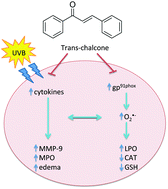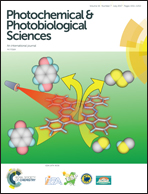trans-Chalcone, a flavonoid precursor, inhibits UV-induced skin inflammation and oxidative stress in mice by targeting NADPH oxidase and cytokine production
Abstract
trans-Chalcone is a plant flavonoid precursor, which lacks broad investigation on its biological activity in inflammatory processes. In the present study, anti-inflammatory and antioxidant mechanisms of systemic administration with trans-chalcone, a flavonoid precursor, on ultraviolet (UV) irradiation-induced skin inflammation and oxidative stress in hairless mice were investigated by the following parameters: skin edema, myeloperoxidase activity (neutrophil marker), matrix metalloproteinase-9 activity, reduced glutathione levels, catalase activity, lipid peroxidation products, superoxide anion production, gp91phox (NADPH oxidase subunit) mRNA expression by quantitative PCR and cytokine production by ELISA. Systemic treatment with trans-chalcone inhibited skin inflammation by reducing skin edema and neutrophil recruitment, and also inhibited matrix metalloproteinase-9 activity. trans-Chalcone also inhibited oxidative stress, gp91phox mRNA expression, and the production of a wide range of pro-inflammatory cytokines, while it did not affect anti-inflammatory cytokines induced by UV irradiation. However, trans-chalcone did not prevent oxidative stress in vitro, suggesting that its in vivo effect is more related to anti-inflammatory properties rather than a direct antioxidant effect. In conclusion, treatment with trans-chalcone inhibited UV-induced skin inflammation resulting in oxidative stress inhibition in vivo. Therefore, systemic supplementation with this compound may represent an important therapeutic approach in inflammatory skin diseases induced by UV irradiation.



 Please wait while we load your content...
Please wait while we load your content...